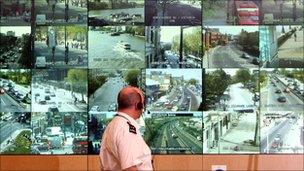'Smart' CCTV could track rioters
- Published

The system is able to track suspects across multiple cameras
CCTV that can automatically monitor criminal behaviour and track suspects is being developed by UK scientists.
Researchers at Kingston University have created a system that uses artificial intelligence to recognise specific types of behaviour, such as someone holding a gun.
The technology is capable of following a person across multiple cameras.
Privacy campaigners warned that it might be used to target groups such as political protesters.
However, the developers insisted that their invention would allow police to focus on law breakers and erase images of innocent civilians.
The technology works by teaching a computer to recognise specific types of public behaviour, known as "trigger events".
"In riot situations, it could be people running - a crowd might converge in a certain place," said Dr James Orwell of Kingston University
"If somebody pulls out a gun, people tend to run in all sorts of directions. These movements can be detected."
Dr James Orwell and his team at Kingston University have developed the technology
When an event is triggered, the software collates video footage from before and after the incident to record a full history of the suspect's movements.
"If a window was smashed and shop looted in a town centre street, the technology would trace back to see who smashed the window and then retrace his steps to see when and where he entered the town centre.
"The technology would also trace where the man had gone after leaving the scene," said Dr Orwell.
The study is part of the ADDPRIV project - a European collaboration to build a surveillance solution that acknowledges wider privacy concerns.
A key element of the system is the automatic deletion of surplus video data.
"There is a mainland European resistance to CCTV - tight controls on how long you can keep data," explained Dr Orwell.
"This project addresses it by saying 'This is the event - let's wrap up everything that's relevant, then delete everything else.'
"We're seeking to use surveillance to help control society, while avoiding the Big Brother nightmare of everybody being seen all the time," he added.
Charles Farrier from anti-surveillance campaign group No CCTV believes that excessive security powers would leave the system open to abuse.
"Merely saying 'We promise we won't track innocent people' isn't good enough," said Mr Farrier.
"If you've got a state-run camera system and the state wants it triggered on, say, peace activists, then they won't be bound by the same rules as everyone else."
- Published22 August 2011
- Published22 August 2011